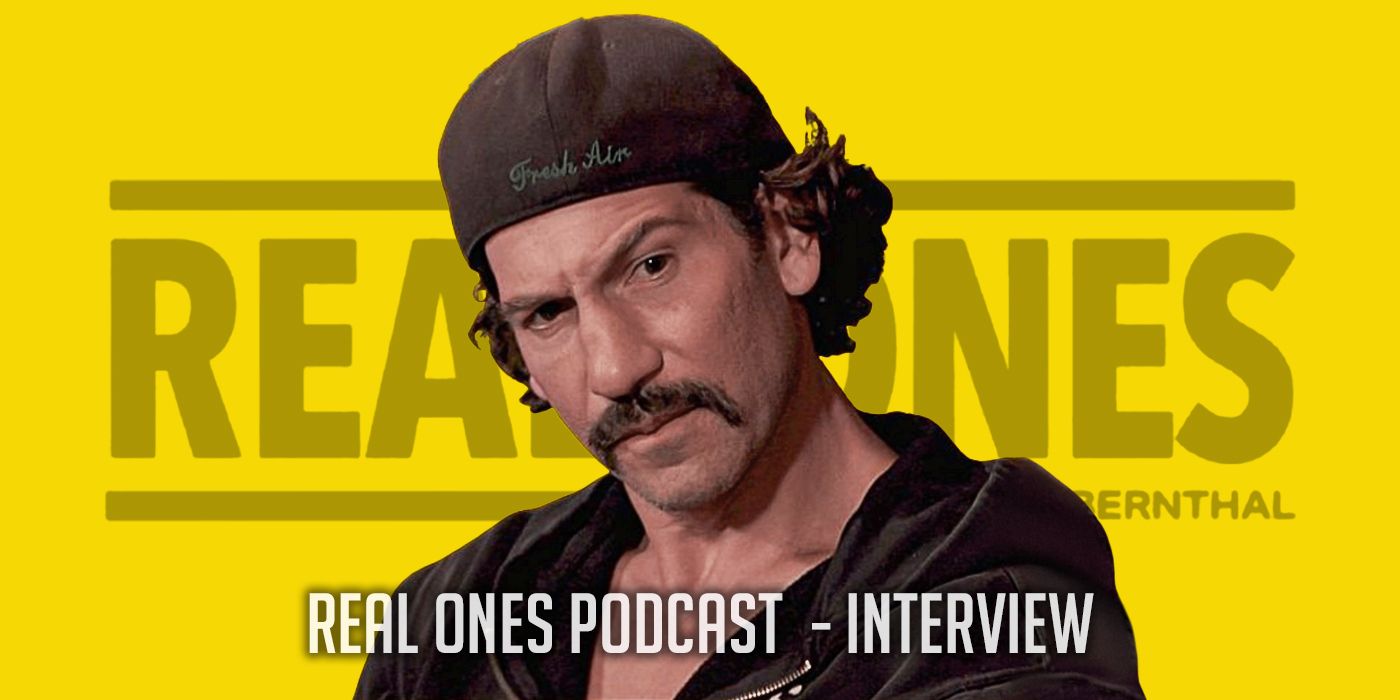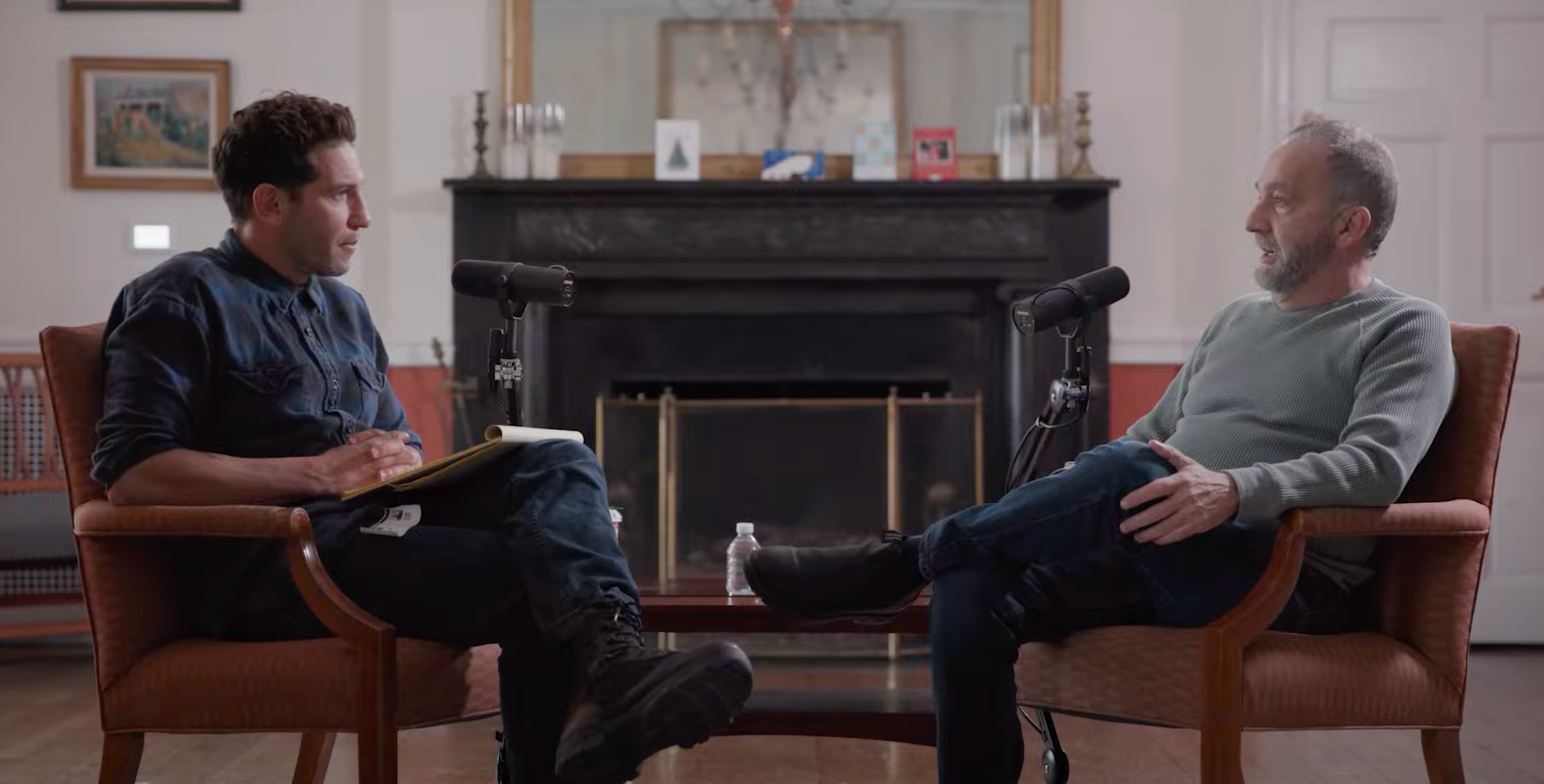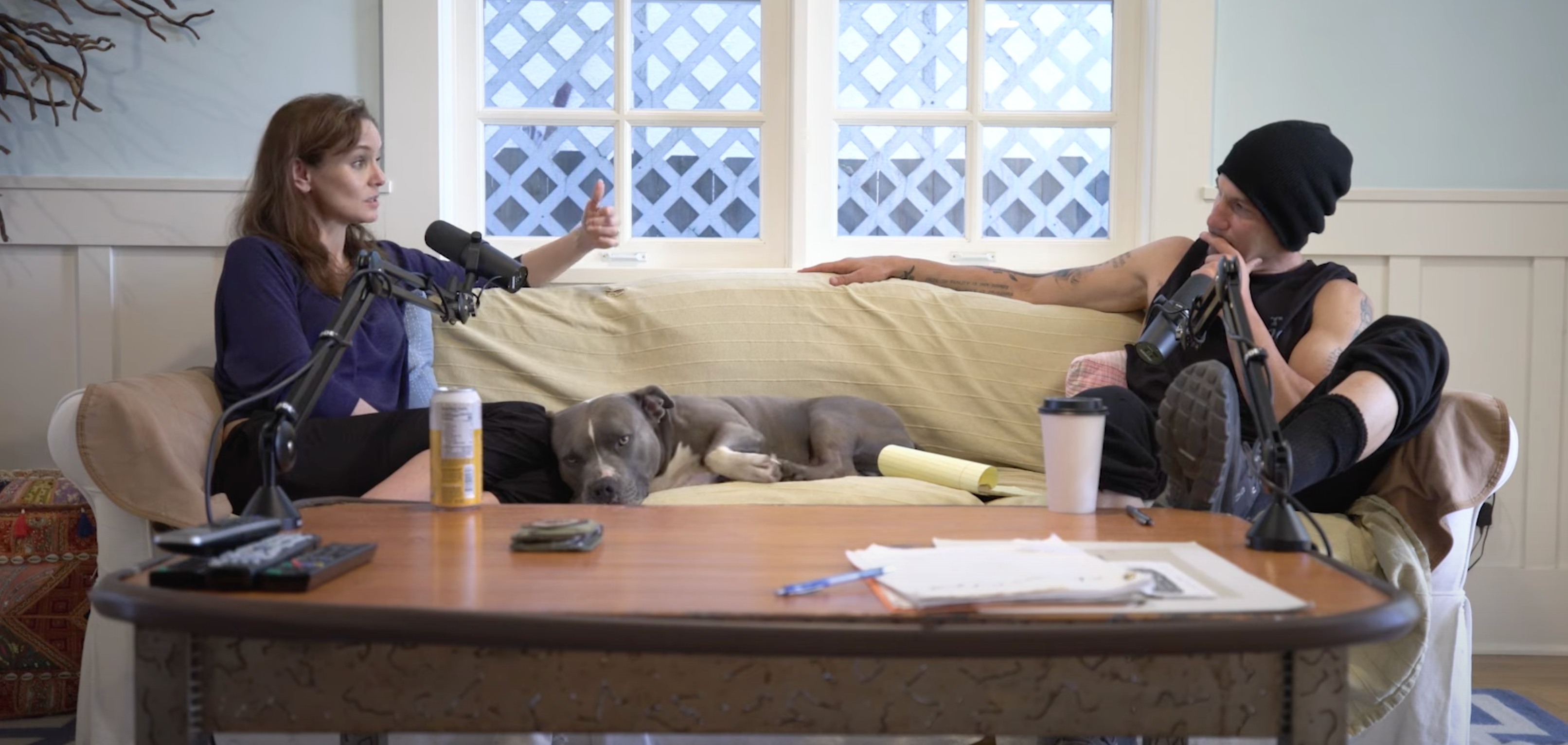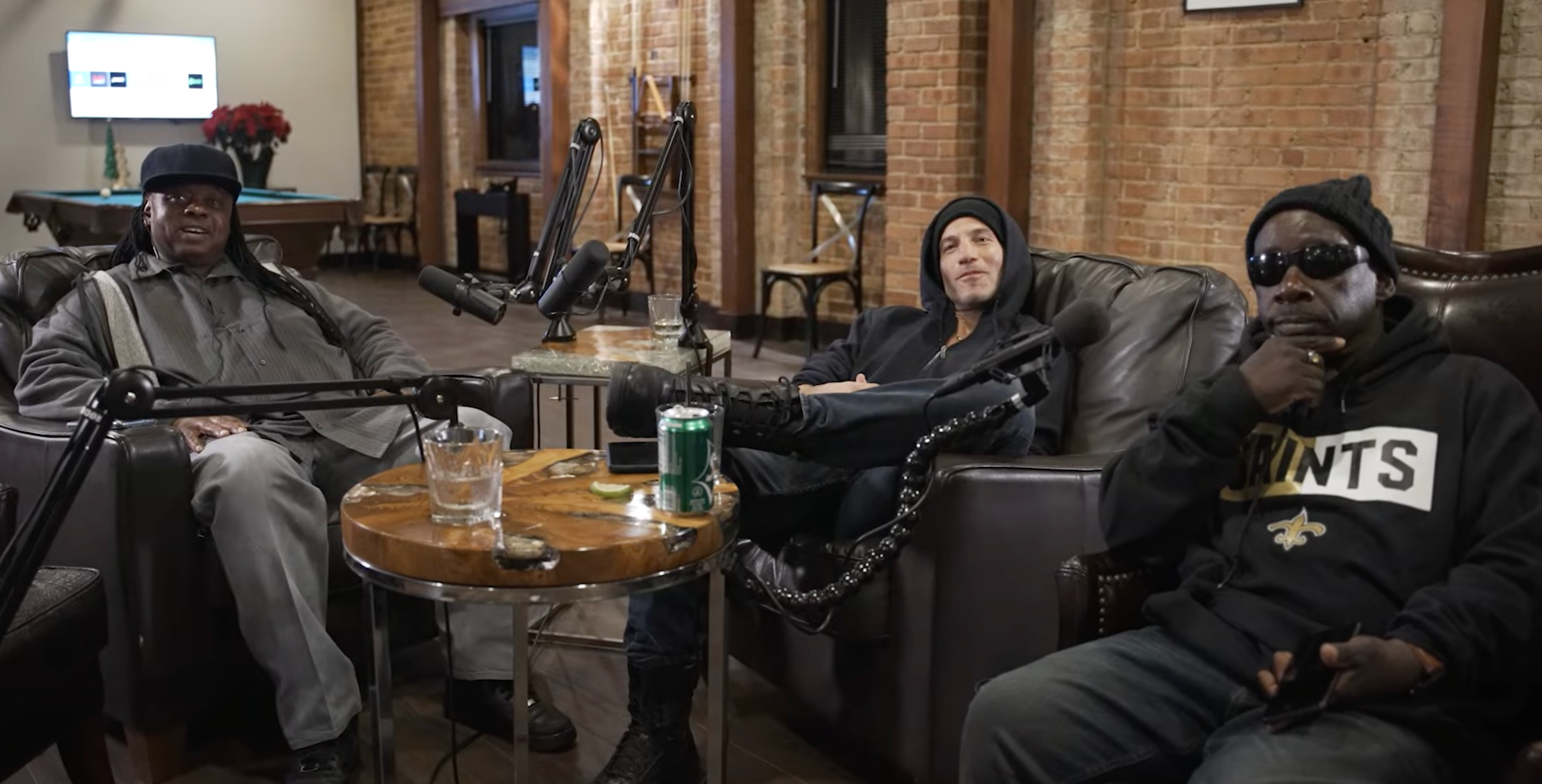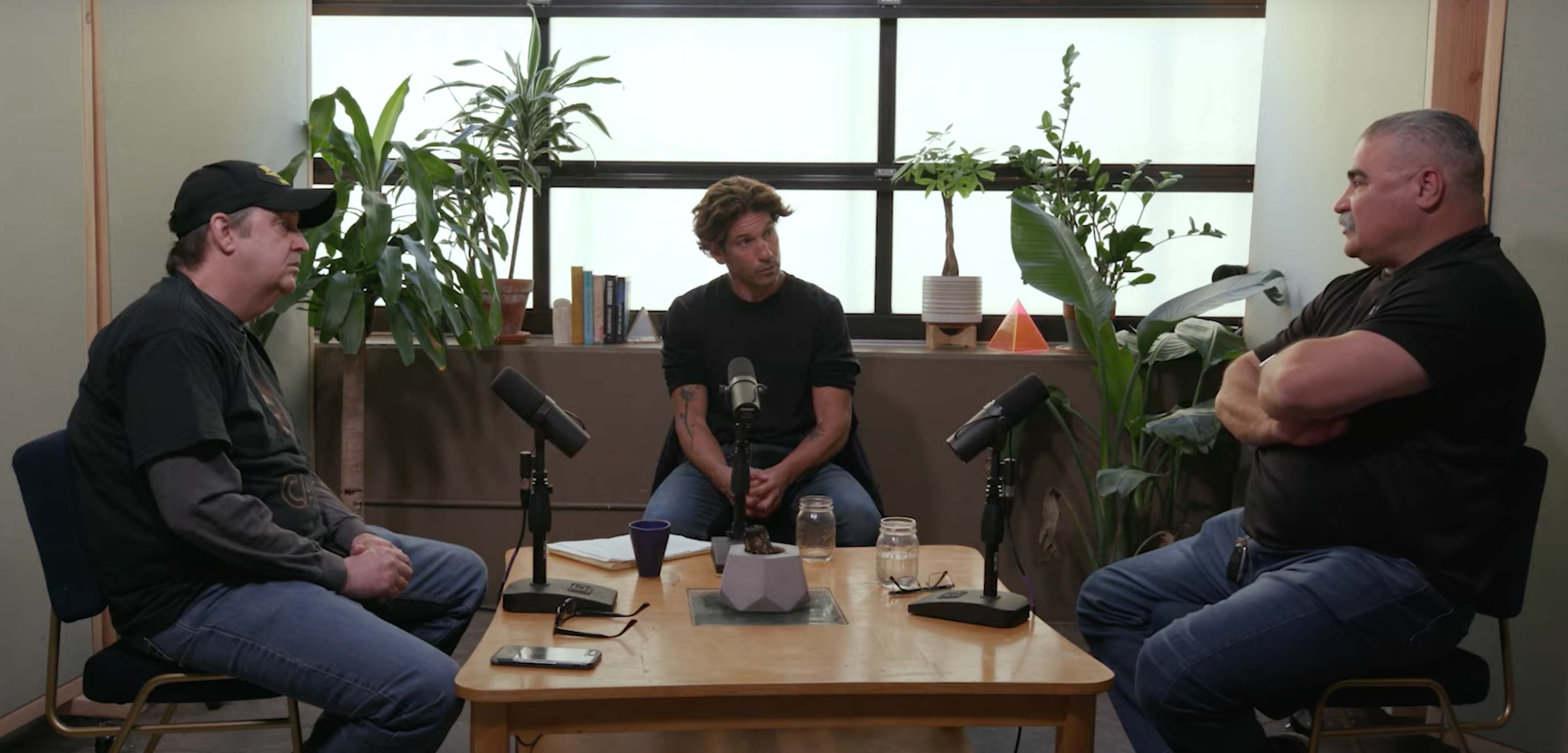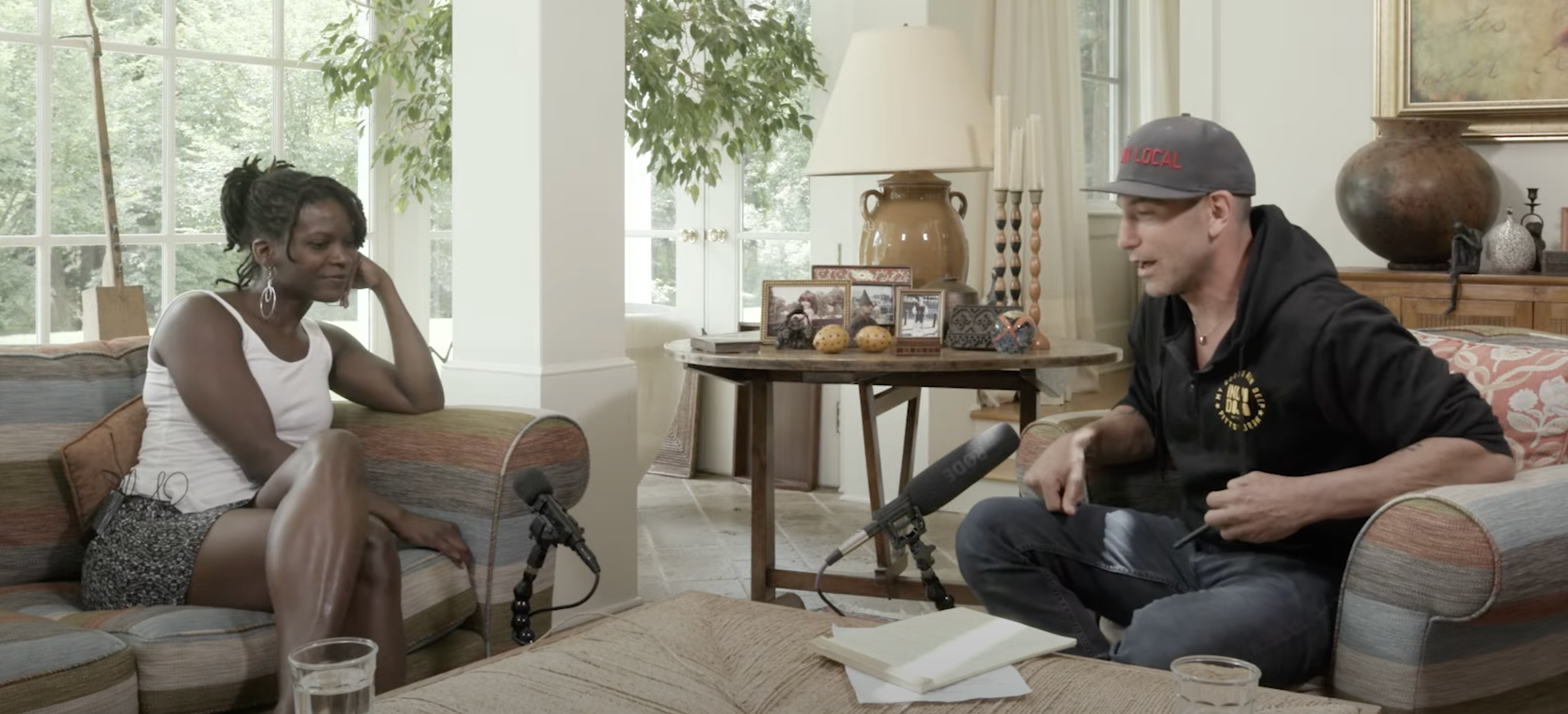While many may recognize Jon Bernthal for his wide range of roles across film and television, there’s another project that’s been occupying his time recently: Real Ones, a podcast he started back in February, sprung out of quarantine and always managing to take its listeners by surprise. Having recently returned for a second season, the show pulls absolutely none of its punches, and delivers some of the most engaging, authentic conversations out there, with Bernthal leading the discussion and putting a foot in the door for real connection and change.
The show, which has recently expanded to Patreon, giving fans the opportunity to engage with each other and the production, seeks to bring together people from all walks of life, and expose listeners to ideas and perspectives they may never have considered. Born out of what Bernthal describes as a “real frustration and disappointment with the state of discourse in the country,” the series has featured everyone from first responders and police officers to gang members and activists, and Collider was lucky enough to sit down and talk with him about the show and its impact on its audience.
During this one-on-one interview, Bernthal discussed his inspiration for the show and what he hopes to do with it in the future, and shared some fantastic stories from his time working on the project, about what it’s like bringing together different perspectives and engaging with people he cares for and admires deeply — those he believes to “walk the walk,” to use his words. It’s tough to summarize the wide-reaching conversation we had in just a few sentences, so check out the full interview below, stream Real Ones on Apple Podcasts, Spotify, or wherever you get your podcasts, and be sure to sign up for the show’s Patreon for behind-the-scenes access to exclusive content, early episodes, and more.
COLLIDER: I want to start off by asking where, not necessarily the inspiration for this show came from, but what motivated you? Was there anything beyond what you’ve said about leveling the playing field in terms of having civil discussion?
JON BERNTHAL: I mean, in one sense, no, really. I mean…I think it really did come from just this real frustration and disappointment with the state of discourse in the country right now. I think, through the pandemic, as people were so isolated and locked away from each other, I just felt that, really, the powers of division were just affecting discourse in this really toxic and negative way. So much of the time, I just felt like the key issues that mean so much to us were just being discussed by people that were just on complete opposite sides and just adding to the chaos and toxicity of division. What I felt all these folks really had in common is that they were so-called experts or pundits or celebrities, people who kind of do what I do.
I was really frustrated by that because I just really felt, and know really in my heart, that with experience comes empathy, and with folks that really have boots on the ground on these key issues, people are way more alike, I think, than different. We all love our kids. We all love our families. We all want the best, and these divisions that we're plagued with, of politics and sexual orientation and race and where you're from in the country…to me, it's all a bunch of nonsense. I'll say also just, sort of, acutely, in the wake of George Floyd, I was so utterly disgusted by the acts that Derek Chauvin and what that video represented to me, and I really desperately wanted to get out there and be a part of that uprising and part of communicating the level of my disgust and what that meant. Especially coming up as a kid in the '90s and just remembering exactly where I was with Rodney King and just, sort of, the plague of all these kinds of videos.
At the same time, I saw people on TV throwing rocks and bottles at police officers, and I'm enormously close to that community. Every single one of those police officers that something was getting thrown at, I look at as somebody's son or daughter, brother or sister, father or mother, and that disgusted me as well. Every time I went out there and marched and was part of that movement, whatever way I could, I also made sure I went by Newton Division and showed my love and respect for the good people that keep us safe and protect our streets. To be able to be both of those things and to be able to give a voice to that is enormously important. Not for me to say it, because who cares if I say it. Let's get the people themselves. I've just been so blessed in my life to have these wonderful people that have had such a huge influence on me, and that's who I want to give the mic to right now.
You've had a large variety of people on this show. I mean, you've had your brother on, you had Sarah Wayne Callies [from The Walking Dead] on recently, but you've also had cops on, you had the Bottom Boys on. What about a specific person makes you look at them and think, "This is the kind of person whose experience I want to expose the world to"?
BERNTHAL: Look, I always say it's got to be somebody who walks the walk, doesn't just talk about it. Uniformly, everyone I've had on has the sort of absolute, complete, and total respect of their peers. They're people who exemplify real courage, real honor, real integrity. They're people who have the sort of decency and sense of patriotism — because I believe it really is patriotism — to be, not only willing, but hungry to sit down with folks that think differently than them and go into every conversation with a real sense of humility, with a real sense that, within the conversation, you could learn something. Folks who aren't really comfortable talking and sharing. They're more listeners and experiencers. People with a real sense of curiosity.
Again, I think that the folks that come on my show, they're not used to being on camera a lot of the time. They're not used to giving interviews. They're used to, really, doing the very things that I think they're put on this world to do, and they're the folks that keep us safe. They're the folks that teach us. They're the folks that walk the walk so many folks don't have the courage to walk, and I'm grateful to each one of them.
In terms of doing this as a podcast and maybe not as a TV show because you're more focused on the conversation, what does moving into an audio production space feel like? Is it different from working on film and television, or [does it] feel natural in terms of the progression of the conversation, so to speak?
BERNTHAL: No. It is. Production wise, it's different. I mean, we've got a great team, and I think that the most important thing is that everyone on this team, this really matters to them. Everyone, one hundred percent, has bought into what we're trying to do and is doing it because they believe in it. There's a sense of ownership with everyone who works on this show, literal and, sort of, emotional. We are all very much in this together. It's been the same team from the beginning, and I think that this team is extraordinarily nimble.
One of the great joys for me is that the folks that I've had on, so much of the time, they're folks that are really important to me. Now, they're really important to this whole community. Not just the audience, but the production team. Those relationships have continued and fostered in new shows and new conversations, and new projects have spawned off of this. The team is going in and following around some of my guests, and they've already continued to develop new stuff. That's wildly exciting to me.
In terms of both the reception or the demographic, or even just how the show has progressed production wise, is there anything about it that's surprised you, or something that you weren't expecting when you went into it?
BERNTHAL: Look, there's been a surreal sort of interconnectedness of all of this. So many of the folks that have come on my show... I mean, forgive me, but, the folks down in the Pueblos down in South Central, they were having these, kind of, historic major issues with the Newton division of the LAPD. I got folks from either side that are deeply important to me to sit down with each other, and that was not easy. It was not easy to have those folks sit down, but again, because they both walked the walk and because both of them were people who had enormous respect from their peers, enormous respect from their communities, they had both lost and taken from each other.
They had so much more in common than they did apart. They were finishing each other's sentences, and most importantly, a real relationship was formed. I did figure that was going to happen. What I didn't figure was going to happen is, now the theater company that sort of came out of the Pueblo Bishop housing project, they put on a show that I wrote. The Newton Division Police owned the space where the show was up, so we had cops putting lighting up and putting down chairs for these members and ex-members of the Pueblo Bishop Bloods so they could perform. Through this artistic pursuit, they're all hugging each other, and they're all friends from that. The show that they performed was The Bottoms, which is based on the Bottoms Boys of Shreveport. Bojangles from the Pueblo Bishops played Goat, who's one of my best friends from the Bottoms, so there's been this crazy interconnectedness to it that's just been really, really deeply satisfying.
There is this thing, this idea of “real recognizes real”, and these Real Ones are all completely connected. When I brought Detective Severino from the Baltimore Police Department down to Shreveport, not only did he get to know Carl Townley from the Caddo Parish Police Department down in Louisiana, but he got to know Goat and Bam, who just got out of prison. There was a connection there, and I loved bringing these guys together and these folks together. It's been really fruitful. The stuff that they're doing outside of our show is great, and it's one of the wonderful things to think about this production team. It's not just that they're nimble, but they're hungry. They see an idea, and they go. I think they just really, not only believe in, kind of, the philosophy behind the show, but more importantly, they believe in the folks that we're bringing on because again, I think they're enormously special.
I think it's, maybe not so much art brings people together, but that sort of general sense of, when you work on something together, there's bound to be that connectedness just in terms of working with other people and I guess, opening you up to perspectives you hadn't thought about before. Because I know, in terms of the audience, it's been really fun to interact with other people who are listening to the show and have the conversations about the topics you're covering, because very rarely do you get that level of discussion in terms of fandom at large. The show has been really, really great for opening that up to an audience, and personally, I think that's one of my favorite parts of seeing it grow and continue.
BERNTHAL: Thank you. For me, too, absolutely. The level of engagement and the conversation that it's ignited has been deeply, deeply satisfying and fascinating. I think, again, really sticking to this, I think we're really tired of just having so much of these, sort of, hot button issues delivered to us from the polls with a bunch of flag waving, with a bunch of echo chambers and preaching. It's so easy to go out there and get the kind of content that you want to hear, to be told what you want to hear, to reinforce stereotypes and reinforce beliefs that have been kind of spoon fed to you, and the criteria here is that there's no agenda with that whatsoever.
Again, the criteria for being on the show is, do you really walk the walk? The folks that we've brought on have really, really gone all the way with it, and really, I believe, have something deeply profound to share with us in such a larger way. I love to get the perspective of folks, not just in the issues that they've spent so much time in, but in broader issues, as well.
One of the questions that I was really interested about was, to you, what makes a good, meaningful conversation? Is it the questions you're asking, is it the people you're bringing to the table, or is it a combination of both?
BERNTHAL: Wow. Well, look. I mean, I'm new to this, and I don't know that I'm especially... Full disclosure, I'm learning, and I had no aspirations whatsoever to interview people, to be an interviewer. I'm kind of learning as I go. What I can absolutely attest to is that the folks that I have on are fascinating, and they are exactly who they say they are. In my opinion, as a father and as an American, they're who I really do genuinely believe. They're folks that we really should be listening to. They should challenge us, and we should challenge them back. I think the key to really good conversation is trust.
I don't want anything from our guests, except for their perspective. I'm not trying to get anyone in a “gotcha” moment. I'm not trying to make anyone feel uncomfortable. I do dig, and I do feel like, if we're going to do this, let's do it. I definitely probe, and sometimes I set people up to come in with somebody who's on, supposedly, the other side. But the idea here, again, the philosophy and the hypothesis is that, we're way closer together than we think on these issues if you are actually in the issue.
We just got out of Calipatria State Prison, and it was fascinating down there. To be able to talk to inmates, guys who are doing life without parole, and for them to talk about hope and for them to talk about folks that they see in the prison guard community and COs, that they deeply respect things that they've seen from those guys that they absolutely admire and think is of the utmost integrity. And it was so interesting to talk to the COs and the administration and to hear these stories about the inmate population and the beauty that they've seen, and the unbelievable perseverance and the unbelievable work ethic and kindness.
We have this stigma about prisons. These folks being judged for the worst moment of their lives, and now they're there [for] ten, twenty, thirty years. We have this stigma that it's just this sort of hotbed of violence and decay and dismay, but to hear stories of hope and vitality out of that community, and togetherness and the way that the prison community is working at times in an enormously positive way, it was totally uplifting to me. I was really excited that we had the opportunity.
Well, I will say, as somebody who interviews people for a living and who's been listening to the show, I think you're doing a fantastic job. Again, these are conversations that, even in other podcasts, even in other similar areas, they're not the conversations that you hear. It's incredibly refreshing to hear those perspectives. I don't think you have anything to worry about in terms of coming in and not knowing anything.
BERNTHAL: I appreciate you saying that.
Of course! But I want to switch gears a little bit to talk about the Patreon, obviously, because that's why we're here. Can you give me a rundown as to why you chose to supplement the show with something like Patreon? What are you guys getting out of it as a team, and what is your audience getting out of it, do you think?
BERNTHAL: Look, I think, first and foremost, I mean, the thing that I'm most excited about is just the sense of community. It really gives us this way of really engaging with the audience, getting feedback from the audience…seeing what's resonating, what's maybe not. One of the things I'm really excited about is to get to know from the audience, what are you interested in? Who do you want to have on? What did you think of that? Who would you like to see paired up with who? That level of engagement is incredible. There's so much exciting stuff to come, and I never in my wildest imagination really thought that it would be this. We take a deep dive into all of our guests' lives, and we, sort of, have this open door policy that way. That anyone who wants to go [and] then take this medium and go interview someone else, or develop their own show — we can, and we provide that infrastructure.
It's nascent. We're just starting, but on Patreon, we can deliver all this, sort of, unfinished material and behind the scenes, from down in Shreveport, Calipatria State Prison, when we're back in Baltimore, going on ride alongs, giving the camera to some of our guests, and really going into their lives. Especially these folks who live a life of service and see exactly what that is. Folks who walk into danger, our team goes in with them, so there's all this stuff. Then I think also — look, we've got to support the show, and I think there's this real pressure on me to just simply make this a Hollywood podcast, if I'm being honest. I surely could just do that, but there's so much of that. Nothing against that, but it's not what I want to do at all.
We will have folks that, for lack of a better word, are famous. There's a few coming up that I think are extraordinarily interesting, but I think it's all about intentionality. The reason why I have somebody on is because I want to explore a topic that they really, really have an unbelievable sense of authenticity and familiarity with, and the folks that I have come on that are actors or hip hop artists or pro athletes or fighters, I'm not just bringing them on to hear about their craft or to hear about their careers. I want to hear about their lives because I really believe that, specifically, their own battles, their own struggles, their triumphs, and their tragedies really, really can speak to our audience in a profound and cogent way. I think that's why Patreon, and so far, it's been extraordinary. It's been great.
Yeah. I think in terms of guests you've had on, talking about doing a Hollywood podcast, you had Kurt Angle on a while ago. I'm from Pittsburgh, so it was quite a nice thing to hear that perspective and feel like it was coming from a place that I understood, that wasn't just a "Go Steelers" type of way.
BERNTHAL: Totally.
So I think the show is definitely is hitting home in a way, I think, that a lot of people can appreciate and in, sort of, more specific ways than just talking about a craft.
BERNTHAL: I think so, and look…Kurt, he had so much courage in that interview, and it was so much more than wrestling or Pittsburgh. He really talked about addiction and losing folks and, sort of, the plight of things that are affecting that part of the country right now. He went into it, again, with such courage and such wisdom. I don't think that's a conversation that folks are going to have easily, unless you really know the person, and I'm really aware that, again, Kurt's family. As somebody who is asked to come on and talk and be interviewed, it's not always the easiest thing…and I have a profound respect for that. I'm really aware that I'm asking folks for something, these folks that I really love, and I'm just so sort of blown away with gratitude that my guests come on, and they trust me.
Again, I think that's kind of what makes us unique. Everybody who comes on pretty much is someone who I love and who's really, really a part of my life. I'm just blessed that they also happen to be unbelievably fascinating people from all walks of life.
In the vein of guests, you've covered such a wide range of topics. Is there anybody or any one thing that you would like to bring on or talk about that you haven't been able to yet that you'd like to?
BERNTHAL: It's kind of endless. I mean, what's top of mind, what I've been working on more than anything is getting my wife to come on. When you speak about Pittsburgh, my wife was an ICU trauma nurse for over a decade at the biggest and busiest trauma centers all over the country, and she's got this gang of nurses that have been in the field, again, for decades now. There's no one in this world who has offered me more perspective, who's had a greater role at sort of focusing me and keeping me off my own bullshit than my wife.
There's nothing like the beginning, the decade where every door in Hollywood was being slammed in my face, and it just seemed like I didn't have a chance. The end of the night always ended with me kind of weeping in my bed, thinking my dreams wouldn't come true. Then having my wife come in from the hospital where she was dealing with loss and death and fear and hope and people at their most raw, most vulnerable, people at their strongest and their weakest. And to get that perspective and to see it in how she's a mother, how she's a wife, how she's a human being, how she was put on this earth to be a nurse, to take care of people, I'm fascinated by that. I'm begging. She is not into being on camera, so I'm trying to get that one.
Then out here in Ojai, where I live, [there’s] a very big firefighter community, a very big smoke jumper community, folks that are fighting the wildfires. They've become dear friends of mine, and I'm very much a part of that community. It's fire season now, so they are going to come on. I'm really looking forward to that. I'm really looking at their perspective on the environmental question. These are folks that have grown up here, have been fighting fires. My one friend, Chris Ford, he's up there in his mid-forties, up there with the twenty year olds, up in the forests, clearing brush and fighting those fires, and he's been doing it forever. I really want to hear his perspective on what he's seeing year to year and how it just gets hotter and hotter. Again, somebody who's seeing it right there in the epicenter of the crux of where this conversation should be. There's so many more. It's really endless.
Is there, sort of, an expiration date on this project, or do you think this is something you're going to keep doing as long as you possibly can?
BERNTHAL: I think this is going to keep going. I mean, I think…again, one of the things that I'm most excited about and what's been the most satisfying is folks like my friend, Kevin Vance, who I've learned so much from, who's been on the podcast now a couple of times. Retired Navy SEAL and firefighter and unbelievable father and husband, and he's just taught me so much in life. He's going to go out and potentially start his own show, and he's interviewing people. That community is so interesting and fascinating, and I believe in Kevin, anything he does. If I can, sort of, foster that or help that or launch that, I'm one hundred percent all in. It's growing from here, but we're also doing these real world projects that are coming out of the Real Ones.
There's something that's going to be coming up shortly. There's a young man who was sentenced to murder when he was fourteen and got thirty-six years to life. His family, I'm enormously close with, and because of a Real Ones episode that hasn't been filmed yet, we've become extraordinarily involved in his case and trying to get him out. He's been in prison longer than he's been out for something he did when he was fourteen, but to explore that and to explore what that is, explore that with the victims and explore what that really means. Again, it's real world action that [is] being sparked by this conversation, and I feel like, if we're going to talk the talk, we’ve got to walk the walk, too. We've got to put it into action, and we are.
We're going to continue our reading process with these episodes, and these scripts down with the Pueblos and involve the police department, bring everyone together through art, like you said, and it's not easy. I mean, these things are not without...we take losses, too. We lost one of the young men in the reading that we did. Later on, was shot and lost his brother, and this whole thing has been very real, for lack of a better word. There are times when it's been so uplifting and so unbelievably inspiring, but also, some of it is really hard.
My friends, my family down in Shreveport right now, those folks, they're really struggling down there right now. That city's getting ripped apart by gun violence, and it's really hitting these guys really, really hard. I think in those Bottoms episodes, we were in a room of over fifty people, and over eighty percent of them had been shot. That's an extraordinary thing for this country, for being the most powerful and rich country in the world. Really looking at that, it's one thing to say it, but let's hear from them. Let's hear their perspective on it. Again, that's what I'm so proud of with this show and why I want to keep going. I know we can keep doing it and keep doing it better.
Real Ones is available to stream on Apple Podcasts, Spotify, or wherever you get your podcasts.

